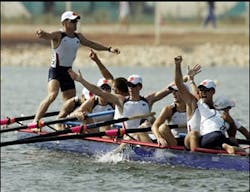New Jersey Firefighter/EMT Wins Olympic Rowing Gold
The U.S. Olympic men's elite eight rowing team won the gold medal, the first time the medal has been won by the U.S in forty years.
Rowing in the bow seat was Jason Read, who is the Chief of Operations for the Amwell Valley First Aid Squad in Ringoes, New Jersey, as well as a Firefighter/EMT with the Hopewell Fire Department in Hopewell, New Jersey.
Read, who has been rowing since 1993, responded to New York City with a crew from his Station on September 11, 2001, after hearing about the attacks, and spent several days there assisting in the rescue, then recovery efforts.
Read's last call before traveling to Europe for the Olympic games was with the Hopewell Fire Department's Emergency Medical Unit, which responded to a mutual aid call in after a chemical storage building at a local swimming club caught fire, which the pool was open and occupied.
Read assisted in triaging over 40 patients, who had been in the pool area, and might have come in contact with smoke from the fire, which contacted Clorine as well as other chemicals.
The boat crew, which is from the Princeton Training Center, where the crews trains on Lake Carnegie, is expected to return to New Jersey around Labor Day, were a large celebration in being planned for Read's return.
U.S. Men's Crew Ends 40-Year Gold Drought
BRETT MARTEL
AP Sports Writer
SCHINIAS, Greece (AP) -- Jason Read wanted an American flag in the boat for the U.S. eight crew's first Olympic victory lap in 40 years, and one exuberant fan was happy to oblige. When Read beckoned, the fan hurdled a barrier and charged into the lake, swimming out to hand off the Stars and Stripes to crew members, who took turns holding it aloft as they rowed along grandstands of cheering fans.
``There's no greater privilege than to represent America at this time with all that's going on in the world,'' said Read, a 26-year-old volunteer fire chief from Ringoes, N.J., who worked search-and-rescue duty in the days after Sept. 11, 2001.
A crew that followed one clutch performance with another ended America's four-decade dry spell in the sport's marquee event.
After overtaking favored Canada with a world-best time in last weekend's heats, the U.S. team proved Sunday that its earlier triumph was no fluke. It led the final race from start to finish.
``Countless numbers of Olympian rowers from '68 on have contacted us, given us money, written us notes, given moral support, come by practice,'' U.S. head coach Mike Teti said. ``We really felt we needed to end this 40 years of drought.''
The victory capped an Olympic regatta in which the U.S. women's eight won silver -- the first medal for that boat in two decades. Their celebration was more subdued since they arrived as a favorite and finished behind a Romanian boat they had edged in their initial heat.
When the men crossed the line first in the next race, Pete Cipollone turned from his coxswain position to face the crowd and splashed water with both hands. After receiving their medals, his teammates threw him off the floating ceremony platform, laughing as their 5-foot-1, 120-pound crewmate flew through the air and splashed down.
When a crew from Philadelphia's Vesper Boat Club won the last U.S. gold in eights at the 1964 Tokyo Games, it marked the 11th time in 15 Olympics that the Americans had finished on top.
The winless streak that followed was expected to end in 2000, when the American eight came to Sydney as three-time defending world champions, but they finished fifth.
The men who finally returned the U.S. eight to the center of an Olympic podium were: Cipollone, and oarsmen Bryan Volpenhein, Beau Hoopman, Dan Beery, Matt Deakin, Joseph Hansen, Chris Ahrens, Wyatt Allen and Read (who sat in that order from stern to bow).
They got off the line quick and had a commanding 3.26-second lead at 1,000 meters. From there, it was only a matter of staying strong enough to keep the lead for the second half of the race.
Volpenhein had been watching Australia, Canada and Germany to his right, expecting challenges. As the field approached the last 500 meters, Hoopman shouted ``The Dutch!'' to Volpenhein, who sets the pace of the eight oarsmen.
The Netherlands closed the gap by nearly two seconds, but the U.S. boat never appeared threatened, finishing in 5:42.48.
``We were concerned,'' Volpenhein said. ``We knew they were coming and we knew they probably had a good sprint. But so do we, and we relied on that.''
The Netherlands won the silver medal and Australia took bronze. Canada, whose loss to the U.S. crew forced them to make the final through a repechage -- or second-chance race -- labored home in fifth.
